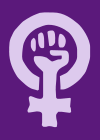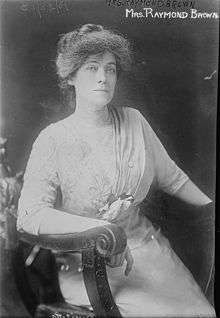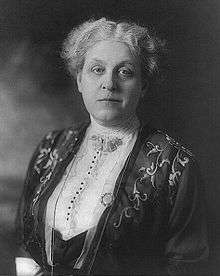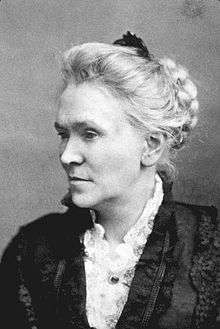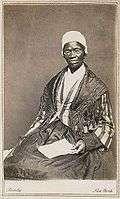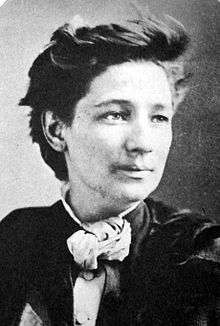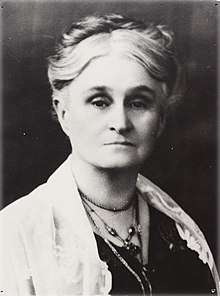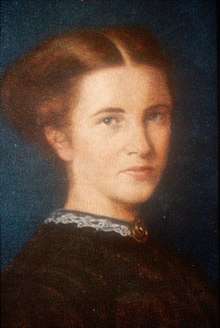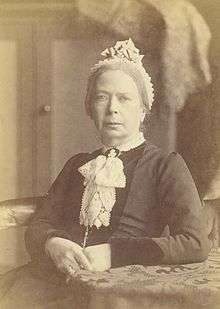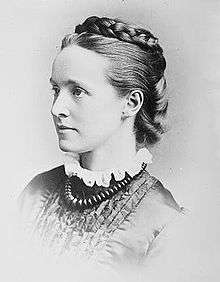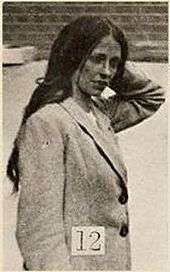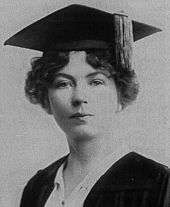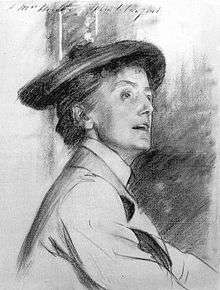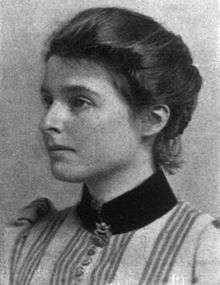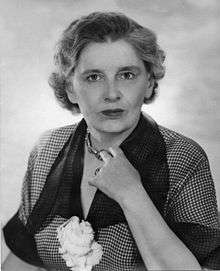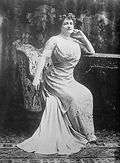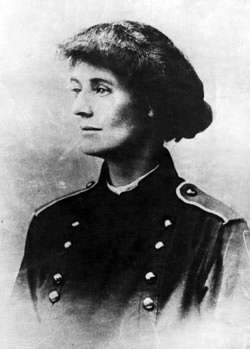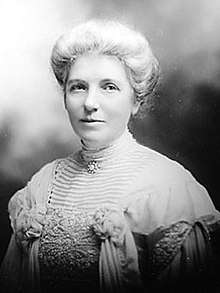List of suffragists and suffragettes
.jpg)
British Women's Social and Political Union lapel pin
This list of suffragists and suffragettes includes noted individuals active in the worldwide women's suffrage movement who have campaigned or strongly advocated for women's suffrage, the organizations which they formed or joined, and the publications which publicized – and, in some nations, continue to publicize – their goals. Suffragists and suffragettes, often members of different groups and societies, used or use differing tactics. For example, "suffragette" in the British usage denotes a more "militant" type of campaigner, while suffragettes in the United States organized such nonviolent events as the Suffrage Hikes, the Woman Suffrage Procession of 1913, and the Silent Sentinels.

Statue of Esther Hobart Morris, located at the front exterior of the Wyoming State Capitol
Argentine
- Cecilia Grierson (1859–1934), the first woman physician in Argentina; supporter of women's emancipation, including suffrage
- Julieta Lanteri (1873–1932) – physician, freethinker, and activist; the first woman to vote in South America
- Alicia Moreau de Justo (1885–1986) – physician, politician, pacifist and human rights activist
- Eva Perón (1919–1952) – First Lady of Argentina, created the first large female political party in the nation
- Elvira Rawson de Dellepiane (1867–1954) – physician, activist for women's and children's rights; co-founder of the Association Pro-Derechos de la Mujer
Australian
- Dora Meeson Coates (1869–1955) – artist, member of British Artists' Suffrage League
- Edith Cowan (1861–1932) – politician, social campaigner, first woman elected to an Australian parliament
- Fanny Furner (1864–1938) – activist, first women to stand for election in local government in Manly
- Belle Theresa Golding (1864–1940) – feminist, suffragist and labor activist
- Kate Dwyer (1861–1949) – schoolteacher and Labor leader, member of the Womanhood Suffrage League of New South Wales
- Vida Goldstein (1869–1949) – feminist politician, first woman in British Empire to stand for election to a national parliament
- Serena Lake – South Australian evangelical preacher, social reformer, campaigner for women's suffrage
- Louisa Lawson (1848–1920) – poet, writer, publisher, and feminist
- Mary Lee (1821–1909) – suffragist and social reformer in South Australia
- Muriel Matters (1877–1969) – lecturer, journalist, educator, actress, elocutionist, member of the Women's Freedom League
- May Jordan McConnel (1860–1929) – trade unionist and suffragist, member of the Women's Equal Franchise Association
- Emma Miller (1839–1917) – pioneer trade union organiser, co-founder of the Women's Equal Franchise Association
- Rose Scott (1847–1925) – founder of the Women's Political Education League
- Catherine Helen Spence (1825–1910) – author, teacher, and journalist; commemorated on a special issue of the Australian five-dollar note
- Jessie Street (1889–1970) – feminist, human rights campaigner
Austrian
- Ernestine von Fürth, (1877–1946) – co-founder of the New Viennese Women's Club, chairwoman of the Austrian Women's Suffrage Committee
- Rosa Welt-Straus (1856–1938) – first Austrian woman to earn a medical degree; representative to the International Woman Suffrage Alliance
Belgian
- Jane Brigode (1870–1952) – politician, member of the International Woman Suffrage Alliance
- Marie Popelin (1846–1913) – lawyer and early feminist political campaigner; worked for universal adult suffrage
Brazilian
- Leolinda de Figueiredo Daltro (1859–1935) – teacher and indigenous' rights activist; co-founder of the Feminine Republican Party
- Celina Guimarães Viana (1890–1972) – Brazilian professor and suffragist; first woman to vote in Brazil
- Ivone Guimarães (1908–1999) – Brazilian professor and activist for women's suffrage
- Jerônima Mesquita (1880–1972) – co-founder of the Federação Brasileira pelo Progresso Feminino
- Carlota Pereira de Queirós (1892–1982) – the first woman to vote and be elected to the Brazilian parliament
- Miêtta Santiago (1903–1995) – Brazilian writer, poet, and lawyer; challenged the constitutionality of the ban on women voting in Brazil
- Maria Werneck de Castro (1909–1993) – lawyer, militant communist, feminist, and supporter of women's suffrage
Bahamian
- Mary Ingraham (1901–1982) – co-founder and president of the Bahamas Women's Suffrage Movement
- Georgianna Kathleen Symonette (1902–1965) – co-founder of the Women's Suffrage Movement
- Mabel Walker (suffragist) (1902–1987) – co-founder of the Women’s Suffrage Movement
British

Mabel Capper (3rd from right, with petition) and fellow suffragettes, 1910
- Wilhelmina Hay Abbott (1884–1957) – editor and feminist lecturer, officer of the International Woman Suffrage Alliance
- Janie Allan (1868–1968) – suffragette activist and significant financial supporter of the WSPU; imprisoned for suffrage activities
- Mary Sophia Allen (1878–1964) – women's rights activist, pioneer policewoman, later involved in far right political activity
- Katharine Russell, Viscountess Amberley (1844–1874) – early advocate of birth control, president of the Bristol and West of England Women's Suffrage Society
- Elizabeth Garrett Anderson (1836–1917) – physician, feminist, first dean of a British medical school, first female mayor, and magistrate in Britain
- Louisa Garrett Anderson (1873–1943) – Chief Surgeon of Women's Hospital Corps, Fellow of Royal Society of Medicine, jailed for her suffragist activities
- Jane Arthur (1827–1907) – educationalist, feminist and activist; campaigned for women's suffrage
- Nancy Astor, Viscountess Astor (1879–1964) – politician, socialite, first woman to sit as a Member of Parliament in the British House of Commons
- Barbara Ayrton-Gould (1886–1950) – Labour labour politician and co-founder of the United Suffragists; jailed for her suffrage activities
- Sarah Jane Baines (1866–1951) – feminist and social reformer; jailed at least fifteen times
- Minnie Baldock (c. 1864 – 1954) – co-founded the first London branch of the WSPU[1]
- Frances Balfour (1858–1931) – president of the National Society for Women's Suffrage
- Rachel Barrett (1874–1953) – member of the WSPU; editor of The Suffragette
- Dorothea Beale (1831–1906) – educational reformer, author, Principal of the Cheltenham Ladies' College
- Lydia Becker (1827–1890) – biologist and astronomer, founder and publisher of the Women's Suffrage Journal
- Ethel Bentham (1861–1931) – doctor, politician, member of the National Union of Women's Suffrage Societies
- Annie Besant (1847–1933) – socialist, theosophist, women's rights activist, writer, orator, and supporter of Irish and Indian self-rule
- Rosa May Billinghurst (1875–1953) – member of the WSPU; jailed multiple times
- Teresa Billington-Greig (1877–1964) – co-founder of Women's Freedom League; jailed for her suffragist activities
- Violet Bland (1863–1940) – member of the WSPU, force-fed in prison
- Barbara Bodichon (1827–1891) – educationalist, artist, feminist, activist for women's rights
- Margaret Bondfield (1873–1953) – politician, chair of the Adult Suffrage Society, first woman Cabinet minister in the United Kingdom
- Elsie Bowerman (1889–1973) – lawyer, member of the WSPU, RMS Titanic survivor
- Annie Leigh Browne (1851–1936) – co-founder of College Hall, London and of Women's Local Government Society
- Frances Buss (1827–1894) – headmistress, pioneer of women's education, member of the Kensington Society
- Josephine Butler (1828–1906) – feminist, author, social reformer concerned about the welfare of prostitutes
- Mona Caird (1854–1932) – Scottish novelist and essayist who wrote in support of women's suffrage
- Mabel Capper (1888–1966) – activist in the WSPU; imprisoned many times, and force-fed
- Isabella Carrie (1878–1981) – schoolteacher and safe house keeper for the WSPU
- Anne Clough (1820–1892) – teacher and promoter of higher education for women
- Jane Cobden (1851–1947) – Liberal politician who was active in many radical causes; co-founder of the Women's Franchise League
- Leonora Cohen (1873–1978) – militant British suffragette and trade unionist; bodyguard for Emmeline Pankhurst
- Florence Annie Conybeare (1872–1916) – campaigned in support of women's suffrage, organized a meeting of the National Union of Women's Suffrage Societies
- Selina Cooper (1864–1946) – textile mill worker, local magistrate, member of the North of England Society for Women's Suffrage
- Jessie Craigen (c.1835–1899) – working-class suffragist who gave speeches all around the country
- Maud Crofts (born 1889) – suffragist, author and first woman accepted as a solicitor[2][3]
- Mary Crudelius (1839–1877) – early supporter of women's suffrage and campaigner for women's education
- Emily Davies (1830–1921) – co-founder of Kensington Society and Britain's first women's college, Girton College, Cambridge University
- Emily Wilding Davison (1872–1913) – militant activist, key member of the WSPU, died in a protest action at a racetrack
- Charlotte Despard (1844–1939) – novelist, Sinn Féin activist, co-founder of the Women's Freedom League
- Flora Drummond (1878–1949) – organiser for WSPU, imprisoned nine times for her activism in Women's Suffrage movement, inspiring orator
- Norah Elam (1878–1961) – prominent member of the WSPU; imprisoned three times
- Elizabeth Clarke Wolstenholme Elmy (1833–1918) – public speaker and writer; formed the first British suffragist society, first paid employee of the British Women's Movement
- Millicent Fawcett (1847–1929) – feminist, writer, political and union leader; president of the National Union of Women's Suffrage Societies
- Elizabeth Fry (1780–1845) – prison reformer, social reformer, philanthropist
- Edith Margaret Garrud (1872–1971) – first trainer of 'the Bodyguard', formed in response to the Cat and Mouse Act
- Mary Gawthorpe (1881–1973) – socialist, trade unionist, editor, active in the suffrage movement in both England and the United States
- Frances Gordon (born c. 1874) – prominent in the militant wing of the Scottish women's suffrage movement; imprisoned and force-fed
- Gerald Gould (1885–1936) – writer, known as a journalist, reviewer, essayist, and poet; co-founder of United Suffragists
- Beatrice Forbes-Robertson Hale (1883–1967) – actress, lectured and wrote on women's rights
- Cicely Hale (1884–1981) – health visitor and author; worked for the WSPU and The Suffragette
- Nellie Hall (1895–1929) – god-daughter of Emmeline Pankhurst, member of the WSPU; imprisoned twice
- Cicely Hamilton (1872–1952) – actress, writer, journalist, feminist
- Marion Coates Hansen (1870–1947) – early member of the WSPU, co-founder of the Women's Freedom League
- Jane Ellen Harrison (1850–1928) – linguist, feminist, co-founder of modern studies in Greek mythology, supporter of women's suffrage
- Evelina Haverfield (1867–1920) – aid worker and nurse in WWI, member of the WSPU, arrested several times
- Margaret Hills (1882–1967) – teacher, public speaker, feminist and socialist; organizer of the NUWSS Election Fighting Fund
- Reverend Claude Hinscliff (fl. 1896–1913 )- founder of the [Anglican] Church League for Women's Suffrage[4][5]
- Emily Hobhouse (1860–1926) – exposed the squalid conditions in concentration camps in South Africa during the Second Boer War; active in the People's Suffrage Federation
- Olive Hockin (1881–1936) – artist and author; imprisoned after arson attacks suspected to be suffragette-related
- Winifred Holtby (1898–1935) – feminist, socialist, and writer, including a new voters guide for women in 1929
- Winifred Horrabin (1887–1971) – socialist activist, journalist, member of the WSPU
- Clemence Housman (1861–1955) – author, illustrator, co-founder of the Suffrage Atelier
- Laurence Housman (1865–1959) – playwright, writer, illustrator, co-founder of the Suffrage Atelier
- Elizabeth How-Martyn (1875–1954) – member of the WSPU and co-founder of the Women's Freedom League
- Ellen Hughes (1867–1927) – Welsh writer, poet, suffragist
- Agnes Husband (1852–1929) – Scottish politician and suffragette
- Elsie Inglis (1864–1917) – Scottish doctor, secretary of the Edinburgh National Society for Women's Suffrage
- Ellen Isabel Jones (d.1948) – suffragette and close associate of the Pankhursts
- Annie Kenney (1879–1953) – leading figure in the WSPU
- Edith Key 1872–1937 – secretary-organiser of the WSPU, Huddersfield branch, and author of the only surviving regional WSPU minute book
- Mary Stewart Kilgour (1851–1955) – educationalist and writer, co-founder of the Union of Practical Suffragists
- Adelaide Knight, (1871–1950) – secretary for the WSPU in Canning Town[6][7]
- Anne Knight (1786–1862) – social reformer, pioneer of feminism, early suffragette and pamphleteer
- Annie Knight (1895–2006) – suffragette in Aberdeen Scotland
- Aeta Adelaide Lamb (1886–1928) – longest serving organizer in the WSPU
- George Lansbury (1859–1940) – social reformer and politician who allied himself with the WSPU
- Lilian Lenton (1891–1972) – active member of the WSPU, winner of a French Red Cross for her service in WWI
- Lady Constance Lytton (1869–1923) – speaker and campaigner for prison reform, votes for women, and birth control
- Margaret Mackworth (1883–1958) – activist and director of more than thirty companies
- Sarah Mair (1846–1941) – campaigner and founder
- Edith Mansell Moullin (1859–1941) – suffragist, settlement worker, and Welsh feminist organization founder
- Kitty Marion (1871–1944) – actress and political activist
- Dora Marsden (1882–1960) – anarcho-feminist, editor of literary journals, and philosopher of language
- Charlotte Marsh (1842–1909) – joined the WSPU in March 1907. In March 1916 sh set up the Independent WSPU
- Selina Martin (1882–1972) – activist
- Harriet Martineau (1802–1876) – social theorist and writer
- Eleanor Marx (1855–1898) – activist and translator
- Flora Masson (1856–1937) – nurse, editor and writer
- Eva McLaren (1852–1921) – suffragist, writer, and political campaigner
- Alice Meynell (1847–1922) – editor, writer, and poet
- Harriet Taylor Mill (1807–1858) – philosopher and women's rights advocate
- John Stuart Mill (1806–1873) – philosopher, political economist, and civil servant
- Hannah Mitchell (1872–1956) – activist
- Dora Montefiore (1851–1933) – activist and writer
- Ethel Moorhead (1869–1955) – painter
- Anna Munro (1881–1962) – activist
- Eunice Murray (1878-1960) – only Scottish woman who stood for election when UK elections were opened to women in 1918.
- Flora Murray (1869–1923) – medical pioneer and activist
- Frances Murray (1843-1919) - a suffragist raised in Scotland, an advocate of women's education, a lecturer in Scottish music and a writer.
- Sylvia Murray (1875-1955) – suffragette and author, the sister of suffragette Eunice Guthrie Murray.
- Mary Neal (1860–1944) – social worker and collector of English folk dances.
- Alison Roberta Noble Neilans (1884–1942) – activist, member of the executive committee of the Women's Freedom League
- Margaret Nevinson (1858-1932) – JP, Poor Law guardian, playwright, member of the Church League for Women's Suffrage
- Ada Nield Chew (1870–1945) – organiser
- Florence Nightingale (1820–1910) – celebrated social reformer and statistician, and the founder of modern nursing
- Adela Pankhurst (1885–1961) – political organizer, co-founder of the Communist Party of Australia and the Australia First Movement
- Christabel Pankhurst (1880–1958) – co-founder and leader of the WSPU
- Emmeline Pankhurst (1858–1928) – a main founder and the leader of the British Suffragette Movement
- Sylvia Pankhurst (1882–1960) – campaigner and anti-fascism activist
- Frances Mary "Fanny" Parker OBE (1875–1924) – New Zealand-born suffragette prominent in the militant wing of the Scottish women's suffrage movement and repeatedly imprisoned for her actions
- Isabella Bream Pearce (1859–1929) Scottish socialist propagandist and suffrage campaigner.
- Edith Pechey (1845–1908) – campaigner for women's rights, involved in a range of social causes
- Emmeline Pethick-Lawrence (1867–1954) – member Suffrage Society, secretary WSPU
- Clara Rackham (1875-1966) – magistrate, prison reformer, factory inspector, long-serving alderman and city councillor in Cambridge
- Eleanor Rathbone (1872–1946) – campaigner for women's rights
- Mary Reid (1880–1921) – Scottish trades unionist
- Margaret Mackworth, 2nd Viscountess Rhondda (1883-1955) – WSPU member, journalist, business woman, founder of the feminist periodical Time and Tide.
- Mary Richardson (1882–1961) – Canadian suffragette, arsonist, head of the women's section of the British Union of Fascists
- Edith Rigby (1872–1948) – founder of St. Peter's School, prominent activist
- Margaret Robertson (1892–1967) – campaigner; organiser of the Election Fighting Fund
- Elizabeth Robins (1862–1952) – Ibsen actress, playwright, public speaker, novelist
- Annot Robinson, née Wilkie, nicknamed Annie, (1874–1925) – pacifist and suffragette[8][9]
- Rona Robinson (1881–1973) – suffragette and in 1905 the first woman in the United Kingdom to gain a first-class degree in chemistry
- Esther Roper (1868–1938) – social justice campaigner
- Arnold Stephenson Rowntree (1872–1951) – MP, philanthropist, and suffragist
- Lolita Roy – believed to have been an important organizer of the Women's Coronation Procession (a suffrage march in London) in 1911, and marched as part of it with either her sisters or her daughters[10][11]
- Agnes Royden (1876–1956) – preacher
- Margaret Sandhurst (1828–1892) – one of the first women elected to a city council in the United Kingdom
- Arabella Scott (1886–1980) – Scottish suffragette who endured five weeks of solitary confinement in Perth prison and force feeding twice a day
- Evelyn Sharp (suffragist) (1869–1955), journalist on The Manchester Guardian, short story writer, tax resister, founder of the United Suffragists
- Sophia Duleep Singh (1876–1948) – had leading roles in the Women's Tax Resistance League, and the WSPU
- Ethel Smyth (1858–1944) – composer, writer
- Ethel Snowden (1881–1951) – socialist, human rights activist, feminist politician
- Flora Stevenson (1839–1905) – Scottish social reformer with interest in education for poor or neglected children
- Louisa Stevenson (1835–1908) – Scottish campaigner for women's university education, effective, well-organised nursing
- Una Harriet Ella Stratford Duval (née Dugdale) (1879–1975) – suffragette and marriage reformer
- Lucy Deane Streatfeild (1865–1950) – civil servant, social worker, one of the first female factory inspectors in UK
- Helena Swanwick (1864–1939) – feminist, pacifist
- Dora Thewlis (1890–1976) – activist
- Elizabeth Thompson (1846–1933) – prominent painter
- Violet Tillard (1874–1922) – nurse, pacifist, supporter of conscientious objectors, relief worker
- Marion Wallace Dunlop (1864–1942) – suffragette went on hunger strike after being arrested for militancy
- Elizabeth (Bessie) Watson (1900–1992) – child suffragette and piper
- Harriet Shaw Weaver (1876–1961) – political activist, magazine editor
- Beatrice Webb (1858–1943) – sociologist, economist, socialist, labour historian, social reformer
- Vera Wentworth (1890–1957) – went to Holloway for the cause and was force fed. She door stepped and then assaulted the Prime Minister twice. She wrote "Three Months in Holloway".
- Rebecca West (1892–1983) – author, journalist, literary critic, travel writer
- Olive Wharry (1886–1947) – artist, arsonist
- Ellen Wilkinson (1891–1947) – politician, Member of Parliament, served as Minister of Education
- Alice Zimmern (1855–1939) – teacher, writer
Bulgarian
- Dimitrana Ivanova (1881–1960) – reform pedagogue, women's rights activist
- Julia Malinova (1869–1953) – women's rights activist
Canadian
- Edith Archibald (1854–1936) – writer who led the Maritime Women's Christian Temperance Union and the National Council of Women of Canada and the Local Council of Women of Halifax
- Laura Borden (1861–1940) – wife of Sir Robert Laird Borden, the eighth Prime Minister of Canada
- Henrietta Muir Edwards (1849–1931) – women's rights activist and reformer
- Gertrude Harding (1889–1977) – one of the highest-ranking and longest-lasting members of the Women's Social and Political Union
- Anna Leonowens (1831–1915) – travel writer, educator and social activist
- Nellie McClung (1873–1951) – politician, author, social activist, member of The Famous Five
- Louise McKinney (1868–1931) – politician, women's rights activist, Alberta legislature
- Emily Murphy (1868–1933) – women's rights activist, jurist, author
- Irene Parlby (1868–1965) – women's farm leader, activist, politician
- Eliza Ritchie (1856–1933) – educator and member of the executive of the Local Council of Women of Halifax
- Emily Stowe (1831–1903) – doctor, campaigned for the country's first medical college for women
Chilean
- Henrietta Müller (1846–1906) – Chilean-British women's rights activist and theosophist
- Marta Vergara (1898–1995) – co-founder of MEMch; Inter-American Commission of Women delegate
Chinese
- Lin Zongsu (1878–1944) – founder of the first suffrage organization in China
Colombian
- Lucila Rubio de Laverde – co-founder of the suffrage organizations, Unión Femenina de Colombia (Women's Union of Colombia) (UFC) and the Alianza Femenina de Colombia (Women's Alliance of Colombia)
- María Currea Manrique (1890–1985) – co-founder of the suffrage organizations, Unión Femenina de Colombia (Women's Union of Colombia) (UFC) and the Alianza Femenina de Colombia (Women's Alliance of Colombia)
Danish
- Mathilde Fibiger (1830–1872) – feminist writer
- Eline Hansen (1859–1919) – co-founder of Dansk Kvinderaad, later Danske Kvinders Nationalråd (DKN)
- Line Luplau (1823–1891) – co-founder and chairperson of the Danske Kvindeforeningers Valgretsforbund or DKV
- Elna Munch (1871–1945) – co-founder of the Landsforbundet for Kvinders Valgret (National Association for Women's Suffrage) or LKV
- Louise Nørlund (1854–1919) – co-founder and chairperson of the Danske Kvindeforeningers Valgretsforbund or DKV
- Johanne Rambusch (1865–1944) – co-founder of the Landsforbundet for Kvinders Valgret (Country Association for Women's Suffrage) or LKV
- Caroline Testman (1839–1919) – co-founder and chairman of the Dansk Kvindesamfund
Dutch
- Lizzy van Dorp (1872–1945) – lawyer, economist, politician, feminist
- Wilhelmina Drucker (1847–1925) – politician, writer
- Mariane van Hogendorp (1834–1909) – feminist
- Cornélie Huygens (1848–1902)[12]
- Aletta Jacobs – Chairperson of Vereeniging voor Vrouwenkiesrecht, 1903–1919
- Rosa Manus (1881–1943) – pacifist
- Catharine van Tussenbroek (1852–1925) – physician, feminist
- Annette Versluys-Poelman – chairperson of Vereeniging voor Vrouwenkiesrecht 1894–1902
- Clara Meijer-Wichmann (1885–1922) – lawyer, writer, anarcho-syndicalist, feminist, atheist
Egyptian
- Doria Shafik (1908–1975) – feminist, poet and editor
French
- Hubertine Auclert (1848–1914) – feminist, campaigner
- Maria Deraismes (1828–1894) – author, major pioneering force for women's rights
- Jeanne Deroin (1805–1894) – socialist feminist
- Marguerite Durand (1864–1936) – stage actress, journalist, founder of her own newspaper
- Olympe de Gouges (1748–1793) – playwright and political activist
- Louise Michel (1830–1905) – anarchist, school teacher, medical worker
- Madeleine Pelletier (1874–1939) – physician, psychiatrist, socialist activist
- Pauline Roland
- Séverine
- Flora Tristan
- Maria Vérone
German

Bust of Clara Zetkin
- Mathilde Franziska Anneke
- Anita Augspurg
- Gertrud Bäumer
- Lily Braun
- Minna Cauer
- Hedwig Dohm
- Johanna Elberskirchen
- Johanna von Evreinov
- Lida Gustava Heymann
- Luise Koch
- Helene Lange
- Louise Otto-Peters
- Bertha Pappenheim
- Alice Salomon
- Käthe Schirmacher
- Auguste Schmidt
- Marie Stritt
- Marianne Weber
- Clara Zetkin
Greek
- Kalliroi Parren (1861–1940) – founder of the Greek women's movement
- Avra Theodoropoulou
Haitian
Icelandic
- Bríet Bjarnhéðinsdóttir (1856–1940) – founded the first women's magazine and first suffrage organization in Iceland
Indian
Irish
- Louie Bennett
- Mary Fleetwood Berry
- Cissie Cahalan
- Helen Chenevix
- Frances Power Cobbe
- Margaret "Gretta" Cousins (1878–1954) – Irish-Indian, established All India Women's Conference, co-founded Irish Women's Franchise League
- Charlotte Despard
- Norah Elam, a.k.a. Norah Dacre Fox
- Eva Gore-Booth
- Anna Haslam (1829–1922) – founder of the Dublin Women's Suffrage Association
- Mary Hayden
- Kathleen Lynn
- Mary MacSwiney
- Margaret McCoubrey
- Mary Ann McCracken
- Constance Markievicz
- Helena Molony
- Florence Moon
- Alicia Adelaide Needham
- Mary Donovan O'Sullivan
- Sarah Persse
- Jenny Wyse Power
- Hanna Sheehy-Skeffington – founder-member of the Irish Women's Franchise League
- Isabella Tod
- Anna Wheeler
Italian
Japanese
- Raicho Hiratsuka (1886–1971)
- Fusae Ichikawa (1893–1981) – founded the nation's first women's suffrage organization, the Women's Suffrage League of Japan; president of the New Japan Women's League
- Shidzue Katō (1897–2001)
- Oku Mumeo (1895–1997)
- Shigeri Yamataka (1899–1977)
Jordanian
- Emily Bisharat (d. 2004) – first female lawyer in Jordan, fought for women's suffrage
Liechtensteinerin
- Melitta Marxer (1923–2015) – one of the "Sleeping Beauties" who took the issue of women's suffrage to the Council of Europe in 1983
Mexican
- Hermila Galindo (1896–1954), Mexican feminist, secretary to President Venustiano Carranza and affected his views on women's rights.
New Zealander
- Georgina Abernethy (c.1859–1906) – active in the Wesleyan church
- Lily May Atkinson (1866–1921) – speaker, writer, mainly active in Wellington
- Amey Daldy (1829–1920) – major leader and recruiter
- Meri Te Tai Mangakāhia (1868–1920) – Māori campaigner for women's suffrage
- Harriet Russell Morison (1862–1925) – co-founded the Dunedin Franchise League
- Mary Ann Müller (1819/1820?–1901) – "New Zealand's pioneer suffragist", pamphleteer, writer
- Frances Mary "Fanny" Parker OBE (1875–1924) – New Zealand-born British suffragette
- Annie Jane Schnackenberg (1835–1905) – founder member of NZ WCTU 1885; National President 1891–1901; President Auckland WCTU 1889–1897
- Kate Sheppard (1848–1934) – premier suffragist in the first country to allow women's voting, appears on New Zealand's ten dollar note
- Anna Stout (1858–1931) – helped establish the WCTU. 1892 President of the Women's Franchise League. 1896 Vice President for the National Council of Women of New Zealand
- Ada Wells (1863–1933) – 1880s activist who later established the Canterbury Women's Institute
Nicaraguan
- Josefa Toledo de Aguirre, also called Josefa Emilia Toledo Murillo (1866–1962) – Nicaraguan feminist, writer and reform pedagogue
Norwegian
- Randi Blehr (1851–1928) – chairperson and co-founder of the Norwegian Association for Women's Rights
- Anna Bugge (1862–1928) – chairman of the Norwegian Association for Women's Rights
- Betzy Kjelsberg (1866–1950) – co-founder of the Norwegian Association for Women's Rights (1884), the National Association for Women's Suffrage (1885)
- Gina Krog (1847–1916) – co-founder of the Norwegian Association for Women's Rights
- Ragna Nielsen (1845–1924) – chairperson of the Norwegian Association for Women's Rights
- Thekla Resvoll (1871–1948) – head of the Norwegian Female Student’s Club and on the board of the women's suffrage movement (Kvinnestemmeretsforeningen)
- Anna Rogstad (1854–1938) – vice president of the Association for Women's Suffrage
Panamanian
Peruvian
Filipino
Puerto Rican
Romanian
Russian
South African
- Anna Petronella van Heerden (1887–1975) – campaigned for women's suffrage in the 1920s
- Julia Solly (1862–1953) – helped acquire the vote for white women in 1930
Spanish
- Concepción Arenal (1820–1893) – pioneer and founder of the feminist movement in Spain. Activist, writer, journalist and lawyer.
- Emilia Pardo Bazán (1851–1921) – Spanish writer, journalist, university professor and support for women's rights and education.
- Carmen de Burgos (1867–1932) – Spanish journalist, writer, translator and women's rights activist.
- Clara Campoamor (1888–1972) – Spanish politician and feminist best known for her advocacy for women's rights and suffrage during the writing of the Spanish constitution of 1931.
- Victoria Kent (1891–1987) – Spanish lawyer, suffragist and politician.
Swedish
- Gertrud Adelborg (1853–1942) – Secretary and leading member of the suffrage movement, presented the first demand of woman suffrage to the government
- Signe Bergman (1869–1960) – co-founder and Chairperson of the National Association for Women's Suffrage
- Emilia Broomé (1866–1925) – first woman in the legislative assembly, introduced the new laws of equal access to all government posts for both genders
- Frigga Carlberg (1851–1925) – Chairperson of the National Association for Women's Suffrage (Gothenburg branch)
- Sofia Gumaelius (1840–1915) – Treasurer of the National Association for Women's Suffrage
- Ann-Margret Holmgren (1850–1940) – co-founder and leading campaigner and recruiter for the National Association for Women's Suffrage
- Ellen Key (1849–1926) – suffragist, ideologist
- Valborg Olander (1861–1943) – Chairperson of the National Association for Women's Suffrage (local branch)
- Elin Wägner (1882–1949) – Campaigner for the National Association for Women's Suffrage
- Lydia Wahlström (1869–1954) – co-founder and Chairperson of the National Association for Women's Suffrage
- Anna Whitlock (1852–1930) – co-founder and Chairperson of the National Association for Women's Suffrage
- Karolina Widerström (1856–1949) – Chairperson of the National Association for Women's Suffrage
Swiss
- Simone Chapuis-Bischof (born March 16, 1931) – head of the Association Suisse Pour les Droits de la Femme (ADF) and the president of the journal Femmes Suisses
- Caroline Farner (1842–1913) – the second female Swiss doctor
- Marie Goegg-Pouchoulin (1842–1913) – Swiss doctor and campaigner for the Swiss women's movement
- Marthe Gosteli (1917–2017) – Swiss suffrage activist and creator of the Swiss archive of women's history
- Ursula Koch (born 1941) – politician, refused the 'male' oath in the Zürich cantonal parliament; first women president of the Social Democratic Party of Switzerland (SP)
- Emilie Lieberherr (1924–2011) – Swiss politician who was a leading figure in the final struggle for women suffrage in Switzerland, and the famous 1969 March to Bern for women suffrage
- Rosa Neuenschwander (1883–1962) – pioneer in vocational education, founder of the Schweizerische Landfrauenverband or SLFV (Swiss Country Association for Women Suffrage)
- Julie von May (von Rued)
- Helene von Mülinen (1850–1924) – founder of Switzerland's organized suffrage movement; created and served as first president of Bund Schweizerischer Frauenvereine (BSF)
Trinidadian
United States
- Mary Newbury Adams (1837–1901) – suffragist and education advocate[13]
- Jane Addams (1860–1935) – social activist, president Women's International League for Peace and Freedom
- Nina E. Allender (1873–1957) – speaker, organizer and cartoonist
- Naomi Anderson (born 1863) – black suffragist, temperance advocate
- Susan B. Anthony (1820–1906) – co-founder and leader National Woman Suffrage Association, one of the leaders of the National American Woman Suffrage Association; Nineteenth Amendment to the United States Constitution, which guaranteed the right of women to vote, was popularly known as the Susan B. Anthony Amendment[14]
- Annie Arniel (1873–1924) – member of the Silent Sentinels, arrested eight times in direct actions
- Elnora Monroe Babcock (1852–1934) – pioneer leader in the suffrage movement; chair of the National Woman Suffrage Association's press department
- Ida B. Wells-Barnett (1862–1931) – African-American journalist, newspaper editor, suffragist, sociologist, and early leader in the civil rights movement
- Bertha Hirsch Baruch – writer, president of the Los Angeles Suffrage Association
- Helen Valeska Bary (1888–1973) – suffragist, researcher, and social reformer[15][16]
- Alva Belmont (1853–1933) – founder of the Political Equality League that was in 1913 merged into the Congressional Union for Woman Suffrage
- Alice Stone Blackwell (1857–1950) – journalist, activist
- Antoinette Brown Blackwell (1825–1921) – co-founder, with Lucy Stone, of the American Woman Suffrage Association
- Henry Browne Blackwell (1825–1909) – founded Woman's Journal with Lucy Stone
- Harriot Eaton Stanton Blatch (1856–1940) – writer (contributor to History of Woman Suffrage), founded Women's Political Union, daughter of pioneering activist Elizabeth Cady Stanton
- Amelia Bloomer (1818–1894) – women's rights and temperance advocate; her name was associated with women's clothing reform style known as bloomers
- Lucy Gwynne Branham (1892–1966) – professor, organizer, lobbyist, active in the National Women's Party and its Silent Sentinels, daughter of suffragette Lucy Fisher Gwynne Branham
- Madeline McDowell Breckinridge (1872–1920) – suffrage leader, one-time vice president of the National Woman Suffrage Association, one of Kentucky's leading Progressive reformers
- Sophonisba Breckinridge (1866–1948) – activist, Progressive Era social reformer, social scientist and innovator in higher education
- Gertrude Foster Brown (1867–1956) – pianist, suffragette, author of Your vote and how to use it (1918)
- Olympia Brown (1835–1926) – activist, first woman to graduate from a theological school, as well as becoming the first full-time ordained minister
- Emma Bugbee (1888–1981) – journalist
- Lucy Burns (1879–1966) – women's rights advocate, co-founder of the National Woman's Party
- Frances Jennings Casement (1840–1928) – voting advocate, married General John S. Casement, who lobbied for voting rights for women
- Carrie Chapman Catt (1859–1947) – president of the National American Woman Suffrage Association, founder of the League of Women Voters and the International Alliance of Women, campaigned for the Nineteenth Amendment to the United States Constitution
- Tennessee Celeste Claflin (1844–1923) – one of the first women to open a Wall Street brokerage firm, advocate of legalized prostitution
- Laura Clay (1849–1941) – co-founder and first president of Kentucky Equal Rights Association, leader of women's suffrage movement, active in the Democratic Party
- Mary Barr Clay (1839–1924) – first Kentuckian to hold the office of president in a national woman’s organization (American Woman Suffrage Association, and the first Kentucky woman to speak publicly on women's rights
- Jennie Collins (1828–1887) – labor reformer, humanitarian, and suffragist
- Sarah Tarleton Colvin (1865–1949) – chairman of the Minnesota chapter of the National Woman's Party, arrested during the "Watchfire for Freedom" demonstrations
- Ida Craft – known as the Colonel, took part in Suffrage Hikes
- Minnie Fisher Cunningham (1882–1964) – first executive secretary of the League of Women Voters, member of the National American Women's Suffrage Association
- Lucile Atcherson Curtis (1894–1986) – first woman in what became the US Foreign Service
- Lucinda Lee Dalton (1847–1925) – Mormon feminist and writer
- Paulina Kellogg Wright Davis (1813–1876) – a founder of the New England Woman Suffrage Association; active with the National Woman Suffrage Association; co-arranged and presided at the first National Women's Rights Convention
- Mary L. Doe (1836–?) – first president of the Michigan State Equal Suffrage Association
- Rheta Childe Dorr (1868–1948) – American journalist, suffragist newspaper editor, writer, and political activist
- Frederick Douglass (1818–1895) – African-American social reformer, orator, writer, statesman
- Anne Dallas Dudley (1876–1955) – suffrage activist; in 1920, she, along with Abby Crawford Milton and Catherine Talty Kenny, led the campaign in Tennessee to approve ratification of the Nineteenth Amendment to the United States Constitution[17][18]
- Abigail Scott Duniway (1834–1915) – women's rights advocate, editor, writer
- Crystal Eastman (1881–1928) – lawyer, antimilitarist, feminist, socialist, and journalist
- Mary F. Eastman – educator, lecturer, writer, and suffragette
- Max Eastman (1883–1969) – writer, philosopher, poet, prominent political activist
- Katherine Philips Edson (1870–1933) – social worker and feminist, worked to add women's suffrage to the California State Constitution
- Elizabeth Piper Ensley (1848–1919) – Caribbean-American woman who was the treasurer of the Colorado Non-Partisan Equal Suffrage Association
- Helga Estby (1860–1942) – Norwegian immigrant, noted for her walk across the United States during 1896 to save her family farm
- Janet Ayer Fairbank (1878–1951) – author and champion of progressive causes
- Lillian Feickert (1877–1945) – suffragette; first woman from New Jersey to run for United States Senate[19]
- Sara Bard Field (1882–1974) – active with the National Advisory Council, National Woman's Party, and in Oregon and Nevada; crossed the US to deliver a petition with 500,000 signatures to President Wilson
- Margaret Foley (1875–1957) – active with the Massachusetts Woman Suffrage Association
- Jessica Garretson Finch – president of the New York Equal Franchise Society
- Mariana Thompson Folsom (July 30, 1845 – January 31, 1909) – Universalist minister and lecturer for Iowa Suffrage Association and Texas Equal Rights[20]
- Clara S. Foltz (1849–1934) – lawyer, sister of US Senator Samuel M. Shortridge
- Nellie Griswold Francis (1874–1969) – founded and led the Everywoman Suffrage Club, an African-American suffragist group in Minnesota, civil rights and anti-lynching activist
- Elisabeth Freeman (1876–1942) – Suffrage Hike participant
- Antoinette Funk (1869–1942) – lawyer and executive secretary of the Congressional Committee of the National American Woman Suffrage Association; supporter of the women's movement in WWI
- Matilda Joslyn Gage (1826–1898) – activist, freethinker, author
- Hermila Galindo, (1896–1954) Mexican political activist, advocate for suffrage
- Edna Fischel Gellhorn (1878–1970) – reformer, co-founder of the National League of Women Voters
- Helen Hoy Greeley (1878-1965) – Secretary, New Jersey Next Campaign (1915), stump speaker, organizer, and mobilizer in California and Oregon campaigns (1911), speaker for Women's Political Union in NYC[21][22]
- Josephine Sophia White Griffing (1814–1872) – active in the American Equal Rights Association and the National Woman Suffrage Association
- Sarah Grimke (1792–1873) – abolitionist, writer
- Eliza Calvert Hall (pen name of Eliza Caroline "Lida" Calvert Obenchain) (1856–1935) – author, women's rights advocate
- Ida Husted Harper (1851–1931) – organizer, major writer and historian of the US suffrage movement
- Florence Jaffray Harriman (1870–1967) – social reformer, organiser and diplomat
- Mary Garrett Hay (1857–1928) – companion to Carrie Chapman Catt and suffrage organizer in New York
- Sallie Davis Hayden (1842–1907) – one of the founders of the suffrage movement in Arizona
- Josephine K. Henry (1846–1928) – Progressive Era women's rights leader, social reformer and writer
- Katharine Houghton Hepburn (1878–1951) – social reformer
- Elsie Hill (1883–1970) – activist
- Helena Hill (1875–1958) – activist, geologist
- Edith Houghton Hooker (1879-1948) – activist, editor The Suffragist
- Julia Ward Howe (1819–1910) – prominent abolitionist, social activist and poet
- Emily Howland (1827–1929) – philanthropist, educator
- Josephine Brawley Hughes (1839–1926) – established the Arizona Suffrage Association in 1891
- Inez Haynes Irwin (1873–1970) – co-founder of the College Equal Suffrage League, active in National Woman's Party, wrote the party's history
- Ada James (1876–1952) – social worker and reformer
- Hester C. Jeffrey (1842–1934) – African American community organizer, creator of the Susan B. Anthony clubs
- Izetta Jewel (1883–1978) – stage actress, women's rights activist, politician and first woman to second the nomination of a presidential candidate at a major American political party convention
- Rosalie Gardiner Jones (1883–1978) – socialite, took part in Suffrage Hike, known as "General Jones"
- Belle Kearney (1863–1939) – speaker and lobbyist for the National American Woman Suffrage Association; first woman elected to the Mississippi State Senate
- Edna Buckman Kearns (1882–1934) – National Woman's Party campaigner, known for her horse-drawn suffrage campaign wagon (now in the collection of New York State Museum)
- Mary Morton Kehew (1859–1918) – labor/social reformer and suffragist from Boston
- Helen Keller (1880–1968) – author and political activist
- Abby Kelley (1811–1887) – abolitionist, radical social reformer, fundraiser, lecturer and organizer for the American Anti-Slavery Society
- Caroline Burnham Kilgore (1838–1909) – the first woman to be admitted to the bar in the Commonwealth of Pennsylvania
- Sarah Knox-Goodrich (1826–1903) – women's rights activist from San Jose, California
- Daisy Elizabeth Adams Lampkin (1883–1965) – civil rights activist, organization executive, and community practitioner
- Clara Chan Lee (1886–1993) – first Chinese American to register to vote in the US, November 8, 1911[23]
- Dora Lewis (1862–1928) – in 1913 became an executive member of the National Women's Party; in 1918 became their chairwoman of finance; in 1919 became their national treasurer; in 1920 headed their ratification committee
- Lena Morrow Lewis (1868–1950) – organizer in South Dakota and Oregon; enlisted the support of labor unions
- Mary Livermore (1820–1905) – journalist and advocate of women's rights
- Florence Luscomb (1887–1985) – architect and prominent leader of Massachusetts suffragists
- Katherine Duer Mackay (1878–1930) – founder of the Equal Franchise Society
- Theresa Malkiel (1874–1949) – labor organizer and suffragist
- Arabella Mansfield (1846–1911) – first female lawyer in the United States, chaired the Iowa Women’s Suffrage Convention in 1870, and worked with Susan B. Anthony
- Wenona Marlin – New York suffragist from Ohio
- Anne Henrietta Martin (1875–1951) – Vice-chairman of National Woman's Party, arrested as a Silent Sentinel, president Nevada Equal Franchise Society, first US woman to run for Senate
- Ellis Meredith (1865–1955) – journalist
- Jane Hungerford Milbank (1871–1931) – author and poet
- Inez Milholland (1886–1916) – key participant in the National Woman's Party and the Woman Suffrage Parade of 1913
- Harriet May Mills (1857–1936) – prominent civil rights leader, played a major role in women's rights movement
- Abby Crawford Milton (1881–1991) – traveled throughout Tennessee making speeches and organizing suffrage leagues in small communities; in 1920, she, along with Anne Dallas Dudley and Catherine Talty Kenny, led the campaign in Tennessee to approve ratification of the Nineteenth Amendment to the US Constitution[17][18]
- Virginia Minor (1824–1894) – co-founder and president of the Woman's Suffrage Association of Missouri; unsuccessfully argued in Minor v. Happersett (1874 Supreme Court case) that the Fourteenth Amendment gave women the right to vote
- Esther Hobart Morris (1814–1902) – first female Justice of the Peace in the United States
- Mary Foulke Morrisson (1879–1971) – organizer of 1916 suffrage parade in Chicago at the Republican national Convention; founder of chapters of the League of Women Voters
- Lucretia Mott (1793–1880) – Quaker, abolitionist; women's rights activist; social reformer
- Frances Lillian Willard "Fannie" Munds (1866–1948) – leader of the suffrage movement in Arizona and member of the Arizona Senate
- Sarah Massey Overton (1850–1914) – women's rights activist and black rights activist
- Maud Wood Park (1871–1955) – founder of the College Equal Suffrage League, co-founder of the Boston Equal Suffrage Association for Good Government (BESAGG); worked for passage of the 19th Amendment
- Alice Paul (1885–1977) – one of the leaders of the 1910s Women's Voting Rights Movement for the 19th Amendment; founder of the National Woman's Party; initiator of the Silent Sentinels and Woman Suffrage Parade of 1913; author of the proposed Equal Rights Amendment
- Juno Frankie Pierce, also known as Frankie Pierce or J. Frankie Pierce (1864–1954) – African-American suffragist[24][25][26][27]
- Helen Pitts (1838–1903) – active in women's rights movement and co-edited The Alpha
- Anita Pollitzer (1894–1975) – photographer, served as National Chairman in the National Woman's Party
- Marjorie Merriweather Post (1887–1973) – philanthropist, heiress to the Post Cereal company fortune
- Jeannette Rankin (June 11, 1880 – May 18, 1973) – first U.S. female member of Congress (R) Montana. Rankin opened congressional debate on a Constitutional amendment granting universal suffrage to women, and voted for the resolution in 1919, which would become the 19th Amendment.
- Florence Kenyon Hayden Rector (1882–1973) – first licensed female architect in the state of Ohio and the only female architect practicing in central Ohio between 1900 and 1930
- Florida Ruffin Ridley (1861–1943) – African-American civil rights activist, suffragist, teacher, writer, and editor from Boston
- Juliet Barrett Rublee (1875–1966) – birth control advocate, suffragist, and film producer[28][29][30]
- Josephine St. Pierre Ruffin (1842–1924) – African-American publisher, journalist, civil rights leader, suffragist, and editor
- Ruth Logan Roberts (1891–1968) – suffragist, activist, YWCA leader, and host of a salon in Harlem
- Margaret Sanger (1879–1966) – birth control activist, sex educator, nurse, established Planned Parenthood Federation of America
- Julia Sears (1840–1929) – pioneering academic and first woman in the US to head a public college, now Minnesota State University
- May Wright Sewall (1844–1920) – chairperson of the National Woman's Suffrage Association's executive committee from 1882 to 1890
- Anna Howard Shaw (1847–1919) – president of National Women's Suffrage Association from 1904 to 1915
- Mary Shaw (1854–1929) – early feminist, playwright and actress
- Pauline Agassiz Shaw (1841–1917) – co-founder and first president of the Boston Equal Suffrage Association for Good Government
- Judith Winsor Smith (1821–1921) – president of the East Boston Woman Suffrage League
- May Gorslin Preston Slosson (1858–1943) – educator and first woman to obtain a doctoral degree in Philosophy in the United States
- The Smiths of Glastonbury – family of 6 women in Connectictut who were active in championing suffrage, property rights, and education for women
- Louise Southgate, M.D. (1857–1941) – physician and suffragist in Covington, Kentucky, a leader in both the Ohio and the Kentucky Equal Rights Association and an early proponent for women's reproductive health
- Elizabeth Cady Stanton (1815–1902) – initiator of the Seneca Falls Convention, author of the Declaration of Sentiments, co-founder of National Women's Suffrage Association, major pioneer of women's rights in America
- Helen Ekin Starrett (1840–1920) – Illinois Woman's Press Association; author, educator, editor, business owner, early suffragist, and one of the two delegates from the 1869 National Convention to attend the Victory Convention in 1920
- Sarah Burger Stearns (1836–1904) – first president of the Minnesota Woman Suffrage Association
- Doris Stevens (1892–1963) – organizer for National American Women Suffrage Association and the National Woman's Party, prominent Silent Sentinels participant, author of Jailed for Freedom
- Lucy Stone (1818–1893) – prominent orator, abolitionist, and a vocal advocate and organizer for the rights for women; the main force behind the American Woman Suffrage Association and the Woman's Journal
- Helen Taft (1891–1987) – daughter of President William Howard Taft; traveled the nation giving pro-suffrage speeches
- Lydia Taft (1712–1778) – first woman known to legally vote in colonial America
- M. Carey Thomas (1857–1935) – educator, linguist, and second President of Bryn Mawr College
- Grace Gallatin Seton Thompson (1872–1959) – American author
- Dorothy Thompson (1893–1961) – Buffalo and New York activist, later journalist and radio broadcaster
- Augusta Lewis Troup (1848–1920) – women's rights activist and journalist who advocated for equal pay, better working conditions for women, and women's right to vote
- Sojourner Truth (c. 1797–1883) – abolitionist, women's rights activist, speaker, gave women's rights speech "Ain't I a Woman?"
- Harriet Tubman (1822–1913) – African-American abolitionist, humanitarian and Union spy during the American Civil War
- Mina Van Winkle (1875–1932) – crusading social worker, groundbreaking police lieutenant and national leader in the protection of girls and other women during the law enforcement and judicial process
- Mabel Vernon (1883–1975) – principal member of the Congressional Union for Women Suffrage, major organizer for the Silent Sentinels
- Sarah E. Wall (1825–1907) – organizer of an anti-tax protest that defended a woman's right not to pay taxation without representation
- Emmeline B. Wells (1828–1921) – American journalist, editor, poet, women's rights advocate, and diarist
- Lilian Welsh (1858–1938) – American physician, educator, and advocate for women's health
- Ruza Wenclawska (1889–1977) – factory inspector and trade union organizer
- Marion Craig Wentworth (1872–1942) – playwright
- Frances Willard (1839–1898) – leader of the Women's Christian Temperance Union and International Council of Women, lecturer, writer
- Victoria Woodhull (1838–1927) – women's rights activist, first woman to speak before a committee of Congress, first female candidate for President of the United States, one of the first women to start a weekly newspaper (Woodhull & Claflin's Weekly,) activist for labor reforms, advocate of free love
- Edith Ainge (1873–1948) – Member of Silent Sentinels, Treasurer for NWP, jailed five times.[31][32][33]
Uruguayan
- Paulina Luisi Janicki (1875–1949) – leader of the feminist movement in Uruguay, first Uruguayan woman to earn a medical degree in Uruguay (1909)
Venezuelan
Yishuvian
Major suffrage organizations
- Alpha Suffrage Club – believed to be the first black women's suffrage association in the United States; began in Chicago, Illinois in 1913 under the initiative of Ida B. Wells-Barnett and Belle Squire
- American Equal Rights Association – from 1866 to 1869, early attempt at a national organization by Lucy Stone, Susan B. Anthony and others
- American Woman Suffrage Association – American suffrage organization formed in 1869 by Lucy Stone and Antoinette Brown Blackwell after a split in the American Equal Rights Association; it joined NAWSA in 1890
- Asociación Nacional de Mujeres Españolas – Spanish organization from 1918 to 1936
- Boston Equal Suffrage Association for Good Government – American organization devoted to women's suffrage in Massachusetts; active from 1901 to 1920
- Bulgarskiat Zhenski Suyut – Bulgarian organization from 1901 to 1944
- Canadian Women's Suffrage Association – founded in 1877, name changed in 1883 to Toronto Women's Suffrage Association
- College Equal Suffrage League – U.S. group founded in 1900 by Maud Wood Park and Inez Haynes Irwin to attract younger women to the movement; merged with the National American Woman Suffrage Association in 1908
- Congressional Union – radical U.S. organization formed in 1913 to campaign for a constitutional amendment for women's voting rights; led by Alice Paul and Lucy Burns; in 1915 changed its name to National Woman's Party
- Dublin Women's Suffrage Association – major Irish organization
- Equal Franchise Society – created and joined by American women of wealth, a politically active organization conducted within a socially comfortable milieu
- French Union for Women's Suffrage – founded in 1909 to promote women's suffrage
- Greek League for Women's Rights, founded 1920 to promote women's political rights and suffrage
- Indiana Woman's Suffrage Association – founded in 1852 to helped women gain the right to vote
- International Alliance of Women – founded in 1904 to promote women's suffrage
- Irish Women's Franchise League – founded in 1908, more radical than the Dublin Association
- Irish Women's Suffrage Society – founded by Isabella Tod as the North of Ireland Women's Suffrage Society in 1872; it was based in Belfast but had branches in other parts of the north[34]
- Landsforbundet for Kvinders Valgret – Danish organization from 1907 to 1915
- National American Woman Suffrage Association (NAWSA) – formed in 1890 by the joining of the American Woman Suffrage Association and the National Woman Suffrage Association
- National Association for Women's Suffrage (Norway) – Norwegian organization from 1898 to 1913
- National Association for Women's Suffrage (Sweden) – Swedish organization from 1902 to 1921
- National Society for Women's Suffrage – Britain's first large suffrage organization, founded in 1867 by Lydia Becker
- National Union of Women's Suffrage Societies – major United Kingdom organization
- National Woman's Party – major United States organization founded in 1915 by Alice Paul and Lucy Burns to campaign for a constitutional amendment; organized the Silent Sentinels; from 1913–1915 the same core group's name was the Congressional Union
- National Women's Rights Convention – series of major US organizing conventions, held from 1850 to 1869
- National Woman Suffrage Association – American organization founded in 1869 by Susan B. Anthony and Elizabeth Cady Stanton after the split in the American Equal Rights Association; joined NAWSA in 1890
- New England Woman Suffrage Association (NEWSA) – formed in 1868 as the first major political organization with women's suffrage as its goal, active until 1920, principal leaders were Julia Ward Howe and Lucy Stone, played key role in forming the American Woman Suffrage Association
- Silent Sentinels – Members of the National Woman's Party who picketed America's White House from Jan. 1917 to June 1919 during Woodrow Wilson's presidency and until the 19th Amendment was passed; initiated and led by Alice Paul
- Vereeniging voor Vrouwenkiesrecht – Dutch organization from 1894 to 1919
- Woman's Christian Temperance Union – active in the suffrage movement, especially in the US and New Zealand
- Women's Franchise League – major British group created in 1889 by Emmeline Pankhurst
- Women's Freedom League – British group founded in 1907 by 70 members of the Women's Social and Political Union in a breakaway following rules changes by Christabel Pankhurst
- Women's Social and Political Union – major suffrage organization in United Kingdom (breakaway from the National Union for Women's Suffrage)
- Women's Trade Union League – American organization formed in 1903, later involved with the campaign for the 19th amendment
Women's suffrage publications
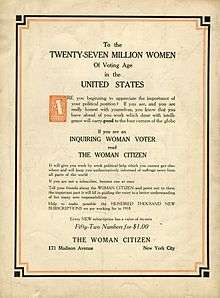
Back cover of The Woman Citizen magazine from Jan 19, 1918
- Nineteenth Amendment to the United States Constitution – drafted by Susan B. Anthony and Elizabeth Cady Stanton in 1878, ratified in 1920
- Declaration of Sentiments – major statement for women's rights, including the right to vote, passed and signed at the Seneca Falls Convention in 1848; mainly written by Elizabeth Cady Stanton
- History of Woman Suffrage – six books produced from 1881 to 1922 by Elizabeth Cady Stanton, Susan B. Anthony, Matilda Joslyn Gage and Ida Husted Harper
- Jus Suffragii – official journal of the International Woman Suffrage Alliance, published monthly from 1906 to 1924
- Suffrage Atelier – publishing collective in England, founded in 1909
- The Freewoman – feminist weekly which, among other topics, covered the suffrage movement; published between November, 1911 and October, 1912 and edited by Dora Marsden and Mary Gawthorpe
- The Liberator – weekly newspaper published by William Lloyd Garrison which, although primarily supporting abolition of slavery, also took up the suffrage cause from 1838 until it closed in 1865
- The Revolution – weekly US newspaper, 1868–1872; official publication of the National Woman Suffrage Association
- The Suffragist – 1913-1920 newspaper of the Congressional Union for Woman Suffrage
- Suffragette Sally – 1911 suffrage novel by Gertrude Colmore
- The Vote – publication of British Women's Freedom League
- Woman's Journal and Suffrage News – major weekly newspaper founded by Lucy Stone and Henry Blackwell in 1870, eventually absorbed other suffrage publications
- Women's Suffrage Journal – magazine published 1870–1890 in the United Kingdom
- Women's Tribune – newspaper published from 1883 to 1909 by Clara Bewick Colby
See also
- List of civil rights leaders
- List of democracy and elections-related topics
- List of feminists
- List of women's rights activists
- Open Christmas Letter
- Seneca Falls Convention
- Suffrage Hikes
- Timeline of first women's suffrage in majority-Muslim countries
- Timeline of women's rights (other than voting)
- Timeline of women's suffrage
- Women's suffrage in Australia
- Women's suffrage in Japan
- Women's suffrage in New Zealand
- Women's suffrage in the United Kingdom
- Women's suffrage in the United States
References
- ↑ Jackson, Sarah (12 October 2015). "The suffragettes weren't just white, middle-class women throwing stones". The Guardian. Retrieved 22 February 2018.
- ↑ "UK | 75 years of women solicitors". BBC News. 1997-12-19. Retrieved 2018-02-28.
- ↑ "Maud Crofts: "We women want not privileges but equality." – First 100 Years". first100years.org.uk.
- ↑ Krista Cowman (9 December 2010). Women in British Politics, c.1689–1979. Palgrave Macmillan. pp. 63–. ISBN 978-1-137-26801-3.
- ↑ Graham Neville (1998). Radical Churchman: Edward Lee Hicks and the New Liberalism. Clarendon Press. pp. 165–. ISBN 978-0-19-826977-9.
- ↑ Adelaide Knight, leader of the first east London suffragettes — East End Women's Museum
- ↑ Diane Atkinson (8 February 2018). Rise Up Women!: The Remarkable Lives of the Suffragettes. Bloomsbury Publishing. pp. 578–. ISBN 978-1-4088-4406-9.
- ↑ Robinson [née Wilkie], Annot Erskine [Annie]. "Robinson [née Wilkie], Annot Erskine [Annie] (1874–1925), suffragist and pacifist | Oxford Dictionary of National Biography". Oxforddnb.com. Retrieved 2018-02-26.
- ↑ "Wilkie, Annot (Robinson) – Socialist, Suffragette Wilkie, Helen – Socialist, Suffragette | Dundee Women's Trail". Dundeewomenstrail.org.uk. 2013-01-18. Retrieved 2018-02-26.
- ↑ "Photograph of Indian suffragettes on the Women's Coronation Procession, 17 June 1911 at Museum of London". Museumoflondonprints.com. 1911-06-17. Retrieved 2018-02-26.
- ↑ Izzy Lyons. "Lolita Roy – the woman who simultaneously fought for British and Indian female suffrage". Telegraph.co.uk. Retrieved 2018-02-26.
- ↑ "Huygens, Cornélie Lydie (1848–1902)". Huygens ING. Retrieved 2014-11-23.
- ↑ Knight, R. Cecilia. "Adams, Mary Newbury (or Newberry)". University of Iowa. Retrieved January 15, 2018.
- ↑ "Senators to Vote on Suffrage Today; Fate of Susan B. Anthony Amendment Hangs in Balance on Eve of Final Test". New York Times. September 26, 1918.
- ↑ Parker, Jacqueline (1974). Helen Valeska Bary: Labor Administration and Social Security: A Woman's Life. Berkeley CA: University of California.
- ↑ Santiago-Valles, Kelvin A. (1994). Subject People and Colonial Discourses: Economic Transformation and Social Disorder in Puerto Rico, 1898–1947. SUNY Press. p. 58, 161. ISBN 9781438418650. Retrieved 1 January 2017.
- 1 2 "Services For Mrs. Dudley To Be Held Thursday". Nashville Banner. September 14, 1955.
- 1 2 Anastatia Sims (1998). "Woman Suffrage Movement". In Carroll Van West. Tennessee Encyclopedia of History and Culture. Tennessee Historical Society. ISBN 1-55853-599-3.
- ↑ "L.F.Feickert". Njwomenshistory.orgpx. Archived from the original on March 14, 2012. Retrieved 2012-08-15.
- ↑ https://tshaonline.org/handbook/online/articles/ffo43
- ↑ "Mount Airy: Home of Helen Hoy Greeley". Piedmont Virginia Digital History: The Land Between the Rivers. 1913-02-07. Retrieved 2018-07-09.
- ↑ "Helen Hoy Greeley Collected Papers (CDG-A), Swarthmore College Peace Collection". Swarthmore Home. 2015-08-21. Retrieved 2018-07-09.
- ↑ Yung, Judy (1995). Unbound Feet: A Social History of Chinese Women in San Francisco. University of California Press.
- ↑ The African-American history of Nashville, Tennessee, 1780–1930: elites and dilemmas, by Bobby L. Lovett, University of Arkansas Press, 1999, page 232
- ↑ Tennessee Through Time, The Later Years. Gibbs Smith. 1 August 2007. pp. 174–. ISBN 978-1-58685-806-3.
- ↑ "Black History Month: J. Frankie Pierce founded school for girls | The Tennessean | tennessean.com". Archive.tennessean.com. 2014-02-14. Retrieved 2015-09-07.
- ↑ "Frankie Pierce & the Tennessee Vocational School for Colored Girls". Ww2.tnstate.edu. Retrieved 2015-09-07.
- ↑ "Juliet Barrett Rublee Papers, 1917–1955: Biographical and Historical Note". Asteria.fivecolleges.edu. Retrieved 2018-03-05.
- ↑ "Mrs. Juliet Barrett Rublee, Grand Marshal of the procession organized by the Congressional Union for Woman Suffrage which on May 9th, 1914 marched to the Capitol to present resolutions gathered in all parts of the United States calling on Congress to take favorable action on the National Woman Suffr | Library of Congress". Loc.gov. Retrieved 2018-03-05.
- ↑ "Juliet Barrett Rublee – Women Film Pioneers Project". Wfpp.cdrs.columbia.edu. Retrieved 2018-03-05.
- ↑ "Miss Edith Ainge, of Jamestown, New York, the first delegate to the convention of the National Woman's Party to arrive at Woman's Party headquarters in Washington, Miss Ainge is holding the New York state banner which will be carried by New York's delegation of 68 women at the conven". The Library of Congress. Retrieved 2018-07-31.
- ↑ "Timeline – Making Women's History". www.sunyjcc.edu. Retrieved 2018-07-31.
- ↑ "Edith Ainge | Turning Point Suffragist Memorial". suffragistmemorial.org. Retrieved 2018-07-31.
- ↑ "Belfast suffragettes". Archived from the original on 31 July 2013. Retrieved 25 July 2013.
This article is issued from
Wikipedia.
The text is licensed under Creative Commons - Attribution - Sharealike.
Additional terms may apply for the media files.
